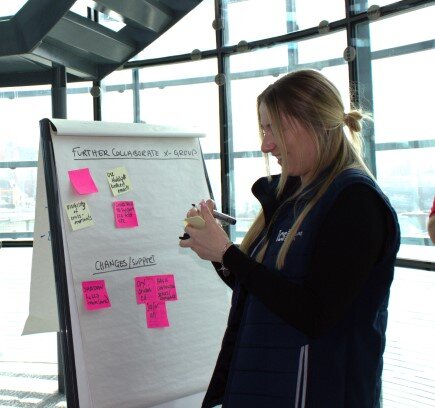An independent endorsement of your training
A consultancy or training provider with a CI training capability can become an Accredited Certifier of Lean Competency enabling it to issue LCS Certificates to learners who progress through its training. It is a valuable addition to the consultant’s service, as building the CI capability of within your client is critical in the journey to developing their sustainable CI culture.
Indeed, many organisations who you may seek to support are actively demanding that consulting partners are LCS accredited.

The benefits of LCS accreditation for consultants
- Added value to your core training offering that can improve margins and create competitive advantage.
- A solution to the growing need from companies and practitioners for accredited training and qualifications with strong market presence and high perceived value.
- Independent endorsement of your CI training credentials.
- A framework around which training courses can be developed.
- Career progression and professional development for practitioners.
- A flexible framework that can be adapted to the differing needs of clients.
- A route to engagement with client senior management that can enhance the overall business relationship.
- Association with a global CI qualification

What our clients say about us
Ryan King
Managing Partner, Reinvigoration

"The primary benefits of LCS and its accreditation, as I see it, lie in enabling organisations to adopt this framework and use it to develop their own training programmes, competency, and capability. The strong connection LCS has with its historical roots and Cardiff University enhances its value. It provides a pathway for organisations to train and certify their own staff, which I think is amazing."
Brad Jeavons
Principal Consultant, Enterprise Excellence Group

Who can become accredited?
Any organisation that has its own CI training programme for its staff can be accredited – it can be in any sector, and geographic location. The programme can be at any scale, from a small team delivering occasional training at different levels to an academy delivering a range of courses to many learners.
The organisation should have in place:
A CI methodology and defined approach to improvement
A CI training programme in place that can be aligned to the LCS framework
Delivery resources and training support mechanisms
LCS Academy in a Box
If you don't have your own improvement training programme is place, don't worry we have ready-made LCS training programmes you can license from us.
Key benefits of our ‘LCS Academy in a Box’:
- Save time and money with our LCS approved content, off the shelf, for both service & manufacturing businesses.
- Access over 50 online learning modules on a wide range of CI topics
- Scale your programme across your organisation globally by implementing a blended learning approach

How to become LCS accredited
There are two types of accreditation for consultancies – Small Business and Standard. The first is for small consultancy firms or start-ups and the latter for larger firms.
To become LCS accredited for the first time, an organisation must have an existing improvement training programme or system or be in the process of developing one, or licence one from us.
A submission portfolio is assembled by the organisation in partnership with the LCS Team. The submission is reviewed by the LCS to ensure that it is able to deliver effective knowledge and practical capability to the LCS standards and any gaps can be identified and addressed.

How much does accreditation cost?
Accreditation fees vary depending on several factors, including the accreditation type required, number of certificates to be issued and sector.
Certify your workforce
Once your Lean training programme has become LCS Accredited, you have the ability to issue LCS Certificates to entire workforces of client organisations. This gives you the opportunity to provide employees with reward, recognition and professional development opportunities, as well as laying the platform for the development of a sustainable CI culture.
The LCS Qualifications Framework
The LCS qualifications framework has seven levels of competency covering the spectrum of Lean knowledge and application. An organisation can start the accreditation at any level depending on how advanced their improvement programme is. While the framework requires a number of subject areas are covered at each level, there is flexibility for the organization to choose the tools, techniques and language to fit with their culture.

Level 1: Fundamental
- Level 1a: Awareness
- Level 1b: Diagnosis & Analysis
- Level 1c: Improvement & Implementation

Level 2: Technical
- Level 2a: Implementation & Design
- Level 2b: Implementation & Leadership

Level 3: Strategic
- Level 3a: Strategic Enterprise
- Level 3b: Strategic Supply Chain
Talk to our qualified experts today about starting your LCS journey





